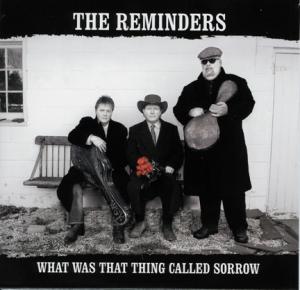Reminders, Ducks Unlimited on Prime Hook, housing
Local musicians John Thompson, Eddie Shockley and Kevin Short – all three pros – recently released a six-song CD of gospel music titled “What Was That Thing Called Sorrow.”
Featuring the poetic songwriting of Thompson, primarily, along with collaboration with Shockley, the music rings with a country/bluegrass brand of spirituality that brings a sense of peace and abiding love. The songs also focus heavily on that other dimension many of us call heaven, beyond the angst of life, where souls question – as in the final scene of Thornton Wilder's “Our Town” - “What was that thing called sorrow?”
In a polished and largely acoustic production, with distinctive local voices we've come to know through local bands like the Funsters, Vinyl Shockley and Big Hat No Cattle, the Reminders sing Thompson's engaging lyrics clearly, following frequently with choruses of tight harmony. “There's a thin place in the veil, where I know that sorrow will not prevail.”
Sorrow, resignation and love combine in the ballad titled “Hymn for a Season.”
The songwriter bemoans the loss of his companion and the fleeting passage of time, but also is thankful for “the season I had with you.” And he celebrates the ultimate destination of his loved one: “It wasn't a thief who took you away; it was a lover with a stronger bouquet.”
Faith, hope and love take center stage in the CD's final song: “Don't Have To Say Goodbye to Love.” Shockley said when the group performs in live concerts, many grieving people have thanked the group for this uplifting song.
Love doesn't end, says the song, “it just moves to another world and carries on,” where loved ones reunite, and “where peace and righteousness kiss.”
Also notable on the CD are the excellent fiddle and banjo riffs of Rickie Simpkins.
Keep an eye out for venues where the Reminders will be playing in the next few months. Songs from their new CD will be featured, and they will have them for sale. In this world of many conflicts, the Reminders are taking their name to heart, bringing us a strong dose of love.
Ducks Unlimited on Prime Hook
Ducks Unlimited, the national conservation organization, recently weighed in on the future of Prime Hook National Wildlife Refuge. Bernie Marczyk, director of conservation programs for DU, wrote the U.S. Fish and Wildlife Service saying DU supports the service's plans to allow all of the management units in the refuge to revert to saltwater marshes.
That's a reversal of DU's position in previous years when it poured significant money into construction of water control structures to create one of the richest freshwater systems on the East Coast.
“In the late 1980s,” wrote Marczyk, “DU was contracted by the [Fish and Wildlife] Service to help survey, design and construct the freshwater impoundments that are in place at the Refuge. The most current science available at the time was used to guide this management decision, and for more than 20 years these impoundments served to benefit Atlantic waterfowl populations immensely. The decision to create freshwater impoundments, however, was made at a time when factors such as global climate change and sea-level rise were poorly understood and scarcely considered a threat to the sustainability of the impoundments.”
The impoundments attracted a wide variety of ducks and geese that fed on the natural food of the freshwater marshes. DU said it has reversed its position because it feels the cost of maintaining the freshwater marshes is unsustainable. It also says creating more saltwater marshes will help offset the extensive loss of saltwater marshes in the Atlantic Flyway over the decades which will benefit black ducks. Black ducks are a species which has not shown strong numbers in recent years.
Hunters won't be thrilled by this news. The limit on black ducks is one bird per hunter per day, while the limit on the mallards, teal, pintails, gadwalls, widgeon and shovelers that thrived in the freshwater system is as many as four ducks per day.
The DU letter leaves a little wiggle room on the freshwater areas fed by Prime Hook Creek between the Primehook Beach and Broadkill Beach roads. “Allowing the impoundments to revert to salt marsh will require the service to place higher emphasis on the management of the remaining freshwater areas on and adjacent to the refuge.” In supporting materials, DU wrote: “A freshwater system within Unit III [between the two roads] is still a viable option under consideration . . . .”
The DU letter does, however, push back on the Fish and Wildlife Service's plan to continue a recent policy of no cooperative farming on refuge lands. “A cooperative farming program could potentially serve as a source of revenue for the Refuge that could be used to offset the cost of recurring management strategies such as invasive species control.”
How it all will play out at the refuge remains to be seen.
Housing upswing continues
Housing, so important over the past several decades to the Sussex economy, is moving steadily into positive territory. The Kiplinger Letter out of Washington, D.C., in its Sept. 28 edition, writes: “Hallelujah. Housing is firmly on the upswing. … By 2014 … once again a significant contributor to job creation, consumer spending and economic gains, bolstering this weak recovery.”
Now we just have to figure out how to harness all the growth coming our way to preserve the natural beauty and attractiveness of the Delmarva Peninsula's largest and most dynamic county.






















































